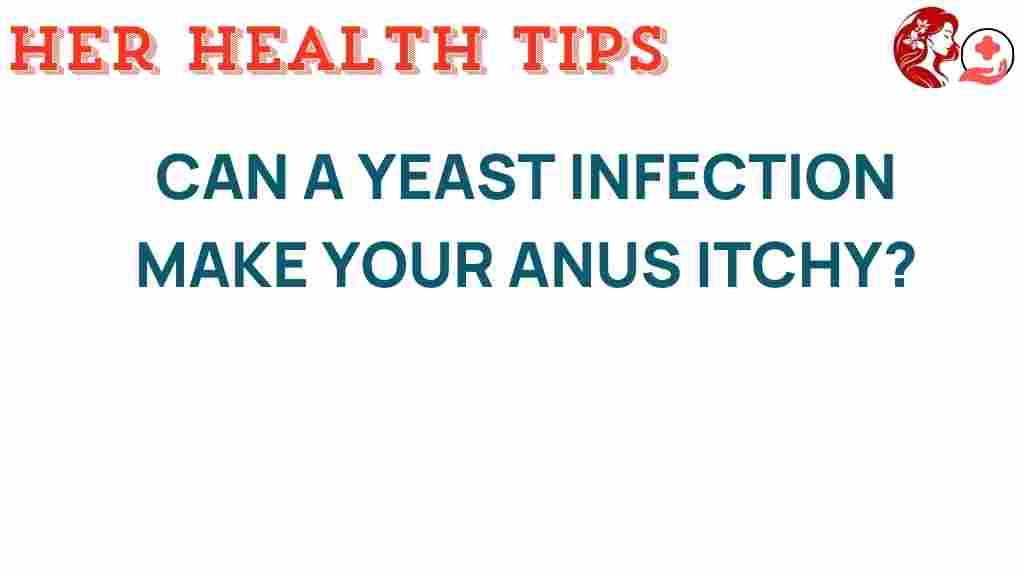Unraveling the Mystery: Can a Yeast Infection Cause Anal Itching?
Anal itching is a common issue that many people experience, but when it occurs, it can leave individuals feeling uncomfortable and confused about its cause. One question that often arises is whether a yeast infection can lead to anal itching. In this article, we will explore the relationship between yeast infections and anal itching, discussing symptoms, treatments, hygiene practices, and preventative measures. Understanding these elements can help alleviate discomfort and maintain better health.
What is a Yeast Infection?
A yeast infection is an overgrowth of the fungus Candida, which is normally present in small amounts in the body. When the balance of microorganisms is disrupted, Candida can proliferate, leading to an infection. While yeast infections are commonly associated with the vaginal area, they can also occur in other parts of the body, including the skin and the mouth.
Symptoms of Yeast Infections
Identifying the symptoms of a yeast infection is crucial for effective treatment. Common symptoms include:
- Itching and irritation in the affected area
- Redness and swelling
- Thick, white discharge (in vaginal yeast infections)
- Burning sensation during urination or intercourse
- Pain or discomfort in the affected area
Can a Yeast Infection Cause Anal Itching?
Yes, a yeast infection can indeed lead to anal itching. This is particularly true if the infection spreads to the anal region or if there is an overgrowth of Candida in the surrounding areas. The symptoms may include:
- Intense itching around the anus
- Redness and inflammation
- Discomfort during bowel movements
For individuals who experience these symptoms, it is important to consider the possibility of a yeast infection, especially if they have a history of such infections.
Causes of Yeast Infections
Yeast infections can be triggered by various factors, including:
- Antibiotic use, which can disrupt the natural balance of bacteria
- Hormonal changes, such as those occurring during menstrual cycles or pregnancy
- Weakened immune system due to illness or stress
- Diabetes, which can create environments conducive to fungal growth
- Poor hygiene or excessive moisture in the anal region
Treatment Options for Yeast Infections
When dealing with a yeast infection that causes anal itching, it is essential to seek appropriate treatment. Common treatment options include:
- Over-the-Counter Antifungal Creams: These can be applied directly to the affected area to alleviate symptoms.
- Prescription Antifungal Medications: For more severe cases, a healthcare provider may prescribe oral antifungal medications.
- Home Remedies: Some individuals find relief using natural remedies, such as yogurt containing live cultures or coconut oil, which may have antifungal properties.
Step-by-Step Process for Managing Anal Itching
If you are experiencing anal itching, follow these steps to manage and treat the condition:
- Identify Symptoms: Take note of when the itching occurs and any additional symptoms.
- Maintain Hygiene: Keep the anal area clean and dry. Use mild soap and water.
- Apply Topical Treatments: Use antifungal creams as directed to reduce itching and inflammation.
- Consult a Healthcare Provider: If symptoms persist or worsen, seek medical advice for proper diagnosis and treatment.
Hygiene Practices to Prevent Yeast Infections and Anal Itching
Maintaining good hygiene is vital in preventing both yeast infections and anal itching. Here are some effective hygiene practices:
- Shower regularly and ensure the anal area is thoroughly cleaned.
- Wear breathable underwear made of cotton to reduce moisture buildup.
- Avoid using scented soaps, wipes, or other products that may irritate the skin.
- Change out of wet clothes promptly after swimming or exercising.
- Maintain a balanced diet to support a healthy immune system.
When to Seek Medical Attention
While many cases of anal itching due to yeast infections can be managed at home, certain situations warrant a visit to a healthcare professional:
- If the itching is severe and persistent
- If there are signs of a secondary infection, such as pus or severe redness
- If you have recurrent yeast infections
- If you experience other concerning symptoms, such as fever or significant pain
Troubleshooting Tips for Persistent Anal Itching
If you find that anal itching persists despite treatment, consider the following troubleshooting tips:
- Review your hygiene practices to ensure they are adequate.
- Consider dietary factors that may contribute to yeast overgrowth, such as high sugar intake.
- Evaluate the use of antibiotics or medications that may disrupt the natural flora.
- Try switching laundry detergents or avoiding fabric softeners that may irritate sensitive skin.
Prevention of Yeast Infections and Anal Itching
Preventing yeast infections and the associated discomfort of anal itching involves a combination of lifestyle adjustments and hygiene practices. Here are some prevention tips:
- Limit sugar intake, as high sugar diets can promote yeast growth.
- Stay hydrated to support overall health and immune function.
- Consider probiotic supplements or foods to help maintain a balanced microbiome.
- Wear loose-fitting clothing to promote airflow and reduce moisture.
- Practice safe sex to prevent the transmission of infections that may complicate yeast infections.
Conclusion
In conclusion, a yeast infection can indeed cause anal itching, and understanding the symptoms and treatments is crucial for relief. Maintaining good hygiene and adopting preventive measures can significantly reduce the risk of both yeast infections and anal discomfort. If symptoms persist or worsen, it is always best to consult with a healthcare provider for a thorough evaluation and appropriate treatment. Remember, your health and comfort are paramount, and taking proactive steps can help you avoid discomfort in the future.
For more information on yeast infections and related conditions, you can visit this informative resource.
Additionally, for guidance on maintaining proper hygiene, check out this helpful article.
This article is in the category Conditions and created by HerHealthTips Team
